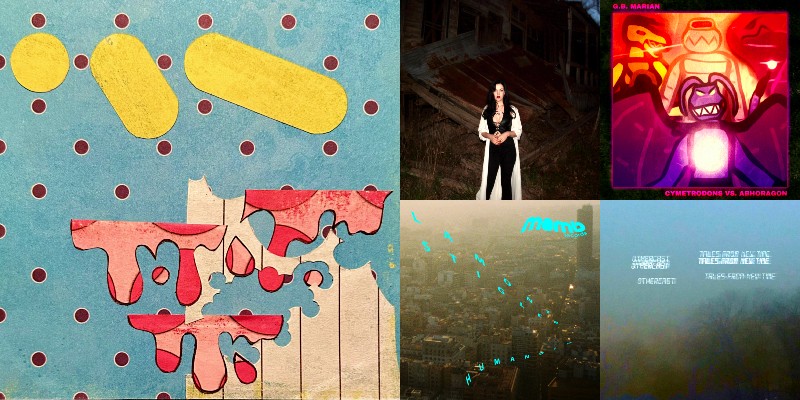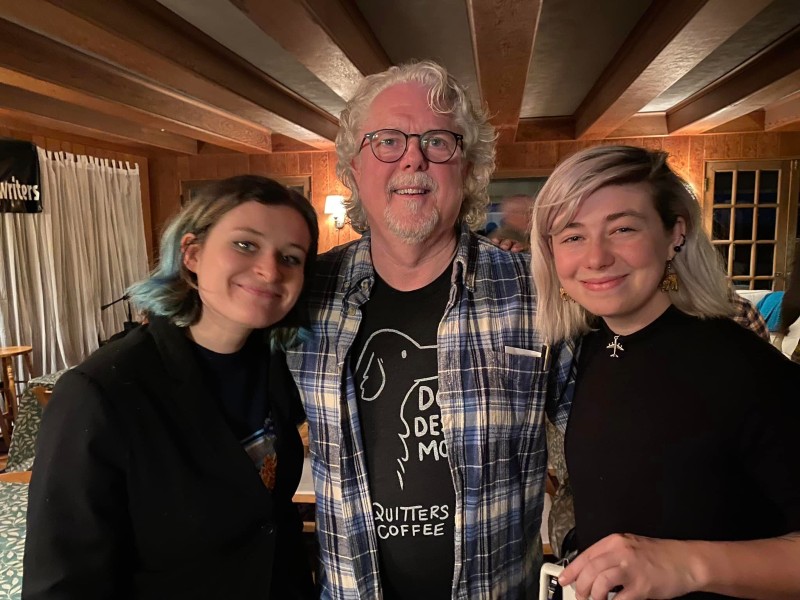Susan Goethel Campbell’s “Garden Repairs” traverses the intersection of natural and man-made worlds

Not long before visiting Ferndale-based artist Susan Goethel Campbell’s Garden Repairs installation at the U-M’s Institute of the Humanities, I’d shared a photograph on social media of a cluster of snow-dusted daffodils in my backyard, shriveled and hunched over. I’d been struck by how often nature mirrors human gesture; how these flowers visibly conveyed what many of us were feeling that morning, as we pulled winter coats and gloves back out of our closets, just days after walking around in shorts. I’d wondered if the natural world shaped the way our physical bodies communicate emotion, or if this is all, in fact, subtle, visible evidence of our inter-relationship with each other.
As it happens, this train of thought was a perfect foundation for experiencing Campbell’s work, which marries the natural and man-made worlds in surprising ways.
John Sinclair, Renowned Detroit Counterculture Poet, Writer, and Activist, Dies at 82

Poet, writer, and activist John Sinclair has died at age 82.
According to the Metro Times, he died of heart failure this morning at Detroit Receiving Hospital and had been struggling with health problems in recent months.
Born in Flint in 1941, Sinclair was a highly regarded leader in Detroit’s counterculture scene of the 1960s and 1970s. Famous for his radical politics, Sinclair also managed the MC5 and co-founded the White Panther Party and the Ann Arbor Sun.
In 1969, he was sentenced to 10 years in prison after offering two joints to an undercover female narcotics officer.
Various public and private protests soon culminated in response to Sinclair’s sentencing, including John Lennon writing a song called “John Sinclair” and the launch of an annual marijuana legalization rally in Ann Arbor that would later become known as Hash Bash.
Theatre Nova's "the ripple, the wave that carried me home" explores how a family deals with a long fight for social justice

A social change agent who’s also a parent lives inside a paradox: Though they’re often driven by hopes of making the world a better place for their child, they must necessarily invest a vast amount of time and passion (that might otherwise be spent on the child) into their cause to even have a chance at moving the needle—and that child’s resentment can all-too-easily take root and grow.
This is one of the primary conflicts at the heart of Christina Anderson’s play the ripple, the wave that carried me home, now on stage at Theatre Nova. The 90-minute drama focuses on Janice (Bryana Hall), a woman living with her husband and sons in Ohio in 1992 as the L.A. riots—sparked by acquittals for the police officers who brutally beat Rodney King—unfold on television.
Friday Five: Laserbeams of Boredom, Othercast, Lamont Stigler, Dollie Rot, G.B. Marian

Friday Five highlights music by Washtenaw County-associated artists and labels.
This week features dubby jams by Laserbeams of Boredom, ambient by Othercast, electro-techno by Lamont Stigler, gothic-folk by Dollie Rot, and electronic soundtracks by G.B. Marian.
Little Victories: Jim Cherewick Finds Cathartic Moments in Everyday Life on "Good News" Album

Jim Cherewick admits he recently went through a breakup.
But it’s not the kind of breakup that immediately comes to mind.
“A lot of it is about leaving that terrible retail [job],” said Cherewick, who previously worked at a big-box store. “It was such a burden—it was sad and it was scary. Getting out of that was so important and needed.”
Cherewick addresses that professional split on “Frosting on Fire,” the melancholic opener from the Ypsilanti singer-songwriter/visual artist’s latest indie-country-folk album Good News.
Backed by somber acoustic guitar and keys, he sings, “Questions stick to my bones / Like how much longer do we get another try here? / Making every single day a treasure cause I’m awake / And I won’t complain, no I won’t complain / I work at one of those stores.”
“As much as I didn’t want to write about it, I did because I wrote it during [the pandemic],” Cherewick said. “The job sucked, and it was soul-crushing. It was so bad, and then they would cut hours, and then they’d be hiring new people.”
Despite that soul-crushing experience, Cherewick finds fleeting moments of catharsis and gratitude on Good News. The album’s eight tracks reflect on the harsh realities of everyday life and yearn for an escape from drudgery, disappointment, and uncertainty.
Breakneck Speed: Mark Jewett Follows Life's Hectic Pace on "Too Fast" Single Featuring The Accidentals

These days, Mark Jewett moves at warp speed.
The Plymouth singer-songwriter maintains a frantic daily pace on his latest single, “Too Fast.”
“It was more of a general feeling of being closed in and trapped and things just coming at me faster than I could deal with them,” said Jewett about the folk-pop track, which features a collaboration with Sav Madigan and Katie Larson of The Accidentals.
“One day, I just took a break at my desk, and I picked up my guitar. I started doing this chunking rhythm like you hear at the beginning of the song. I was drinking coffee, and I thought, ‘I need some energy,’ and the line just popped into my head.”
That initial opening lyric was “I’ve got a thousand watts of black coffee / Pumpin’ through my veins,” but Jewett upped the ante to “Two thousand watts of black coffee” instead.
“Kyle Rasche caught me between shows up at Nor-East’r last year when I was in the merch barn. He said, ‘Man, that’s a great line,’ and he thought I had said something about ‘8,000 watts,’ but it was originally, ‘I’ve got a thousand watts,’” said Jewett, a University of Michigan alumnus, who started writing the track last spring. “I thought maybe there was too much there, so starting it with 2,000 [watts] just punctuates it right at the beginning.”
Love, Grief, Class, and Cancer: A.H. Kim's “Relative Strangers" reimagines a Jane Austen plot set in modern-day California

The details of who knows whom, and what happened in their pasts, result in drama in Ann Arbor author A.H. Kim’s retelling of Sense and Sensibility through her new novel, Relative Strangers, set in modern-day California.
Kim was an attorney and worked at a Fortune 200 company before retiring to write full-time. She raised her family in San Francisco, is a cancer survivor, and now lives in Ann Arbor with her husband. Kim will be in conversation with Camille Pagán at Literati Bookstore on Tuesday, April 2, at 6:30 pm.
The parallels to Jane Austen’s novel are revealed in the premise of the book.
Sonic Journey: Gastón Reggio Ventures From "Michigan" to North Carolina on New Jazz-Fusion Album

For Gastón Reggio, Michigan represents the ideal name for his second full-length album.
The Uruguayan jazz composer and multi-instrumentalist penned most of the album’s tracks while living in Ann Arbor and wanted to capture those experiences from 2019 to 2021.
“Each song has and [strives] to tell a story about things that happened during that time. Particularly, I was looking for an [album] name that worked well in English and Spanish,” said Reggio, who previously drummed with Chirp and is now based in Durham, North Carolina.
“My producer Rodrigo [Cotelo] … mentioned naming the album after the song ‘Michigan’ because it summarized my [time] here and served as the basis for some of the stories that are [sonically] told through my songs.”
On Michigan, Reggio chronicles an inspirational sonic journey filled with jazz, prog rock, and world music influences. The album starts in the Great Lakes state and whisks listeners across the Appalachians to find new musical adventures in North Carolina.
“I just let the ideas for the songs come without any restrictions, and I like to combine all of my influences to create a [personal] way to express myself through music,” he said. “I hope listeners realize the depth and honesty of this music; it’s a part of me, and if you listen to it, you will get to know me a little bit more.”
To learn more about Reggio, I recently spoke with him about growing up in Uruguay, studying music and jazz drums in Brazil, coming to Ann Arbor and joining Chirp, relocating to North Carolina, working on Michigan, and preparing for several upcoming live shows.
Friday Five: Hannah Baiardi, Jazz Drive, Price, Benji Robot, Oak Openings

Friday Five highlights music by Washtenaw County-associated artists and labels.
This week features ethereal piano ballads by Hannah Baiardi, vaporwave synth-pop by Jazz Drive, electronica by Price, remixes by Benji Robot, and improvisations by Oak Openings.
Everyday Monsters: Fangs and Twang Shares the Horrors and Delights of Michigan and Out-of-State Creatures on Latest Album

After years of writing about monsters, Fangs and Twang didn’t expect to find them in human form.
The country-rock trio of Billy LaLonde (drums, vocals), Andy Benes (guitar, vocals), and Joe Bertoletti (bass, vocals) discovered some people started spreading monstrous misinformation at the height of the pandemic.
In response, Benes channeled that disbelief and frustration into the Ypsilanti band’s opening track, “You Monster,” from its fourth album of the same name.
Alongside explosive electric guitar, organ, and fiddle, he sings, “It’s hard to be you and me / When we can’t tell what’s true / It seems to me that we can’t agree / Even that the sky is blue.”
“That song came to me … and it was done in 20 minutes,” Benes said. “All of the lyrics and all of the music just came out, and that was what was on my mind. [It’s about] not having a common set of facts or a common language that we’re speaking anymore as people and how horrible that is.”
The title track also lays the groundwork thematically for the horrors and delights Fangs and Twang uncovers on You Monster.


































